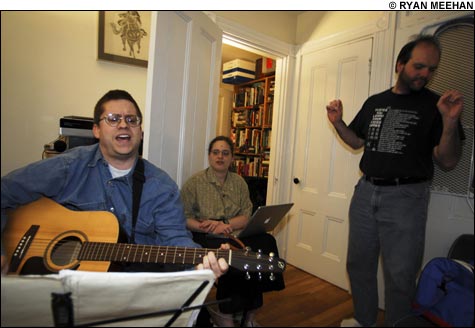
DR. SNARK, a/k/a Newton South High School teacher Paul Estin (with guitar), is one of many locals carrying on the proud filking tradition. |
It’s 3:30 pm on a dreary Sunday, and the 45th running of Boskone is coming to a close. For three days, the area’s oldest sci-fi convention has filled the function rooms of the Westin Waterfront with panel discussions ranging from “Space War: How Would It Really Be Waged — and Why?” to “It’s All Downhill from Tolkien,” and a bedraggled but lively group of geeks is planning on finishing thing up in style. It’s time to filk.
Filk is commonly defined as the music of science-fiction fandom, but there’s more to it than that. “Filk is the music made by filkers,” says 37-year-old Cambridge resident and long-time filker Lara Ortiz de Montellano. “What’s a filker? A person who calls themselves a filker.”
De Montellano is not isolated in her filkitude. Whether it’s at conventions, gatherings of regional groups like MASSFILC, or on countless online message boards, filkers are a vibrant, if niche, global community of nerds devoted to making music in a fun and freeing environment. For them, filk’s not so much a genre as a state of being.
What is it really?
Let’s go back to the beginning. Filk, the story goes, emerged from the first science-fiction conventions of the 1950s, when attendees would huddle in stairwells until the wee hours, singing folk-style songs about their favorite books, space travel, silly monsters, or anything at all, really. A misspelling of “folk” in an early write-up about this phenomenon spawned the term “filk,” and it stuck — like a Tribble on a Trekkie.
In explaining filk, Victor Stevko — president of MASSFILC and de Montellano’s husband — cites fantasy classics such as The Hobbit, in which J.R.R. Tolkien would include the words of a song that Bilbo sang, without, of course, a melody. “So the impulse,” he says, “is to write some music.”
But while an interest in works of science fiction and fantasy may be the filk community’s common denominator, that doesn’t limit the art form’s scope. Filk songs can be completely original or adapted from the tunes of “real” songs. They can be about hobbits, zombies, lost love, dragons, video games, space travel, computers, even about filking and fandom itself. One classic, filker Tom Smith’s “A Boy and His Frog,” is an ode to the late Jim Henson sung from Kermit’s perspective.
Henson’s death “was an event that affected the community strongly,” notes de Montellano.
“People have always written songs about what matters to them,” echoes Seanan Maguire, a 30-year-old Californian and the featured filker at this year’s Boskone. “Look at old Irish folk music. It’s all fairy tales and soap operas, and moving toward the science fiction.”
Since those early impromptu sessions, the filk tradition has migrated from the hotel corridors to the convention schedule. Boskone, for example, hosted five featured filker sets, six open filk circles, and a filk panel over two days. In its four-day span, Arisia — Boston’s other major annual sci-fi con, held the month before Boskone — had 12 filking circles this year, with themes like “Pithy Piratical Anthems” and “Secret Ninja Songs.”